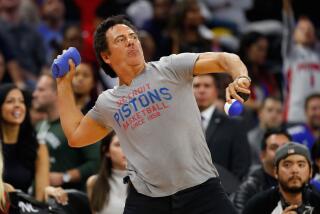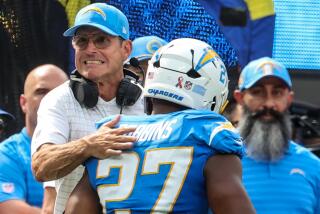Raiders Win Reversal of $2-Million Award to Chargers Former Owner
SAN DIEGO — In what a Los Angeles Raiders official called “another great victory,” a state appellate court on Wednesday overturned a $2-million judgment awarded to former San Diego Chargers owner Eugene Klein in his 1987 malicious prosecution lawsuit against Raiders owner Al Davis.
Klein, who sold the Chargers in 1984, had accused Davis and his club of maliciously singling him out as a defendant in the Raiders’ landmark 1981 antitrust case against the National Football League. Klein suffered a heart attack in 1981 while on the witness stand for the trial, in which the Raiders triumphed and earned the right to move from Oakland to the Los Angeles Memorial Coliseum.
Klein claimed that Davis lacked probable cause for singling him out as a “ringleader” in the antitrust action, and he blamed his heart attack on the strain caused by the federal suit. A San Diego jury agreed and awarded him $10 million in actual and punitive damages--an amount subsequently reduced to $2 million by the trial judge.
But the 4th District Court of Appeal overturned the jury’s decision, declaring Davis the winner and giving Klein nothing.
Klein could not be reached for comment, but Raiders officials openly gloated over the court decision.
“That’s basically what he (Klein) deserves,” said Al LoCasale, Davis’ executive assistant. “It’s another great victory. It’s a total vindication for Al Davis and the Raiders.
“It’s not something that gets an excited emotional response from Al. That happens when we win football games and championships. That’s what we’re in business to do.”
Added Joseph L. Alioto, the San Francisco attorney who represents Davis: “A hometown decision has been corrected by higher justice. Klein could never beat Davis on the football field, so he tried to beat him in court and lost there as well.”
The appellate court ruled against Klein because it said a Superior Court jury, in reaching its verdict, should never have been asked to consider whether Davis had a legitimate legal reason to name the former Chargers owner as a defendant in the antitrust suit. That question should have been decided by the Superior Court trial judge, the three-judge appellate panel said.
But even if the question had been properly put to the judge, Davis had reason to name his football nemesis in the NFL suit. Any reasonable attorney taking the case would have believed that activities undertaken by Klein, as the general partner for the Chargers, would constitute grounds for naming him in the lawsuit, the justices said.
“We conclude the federal cross-claim pursued by the Raiders against Klein individually . . . was legally tenable and thus supported by probable cause,” the appellate court wrote.


